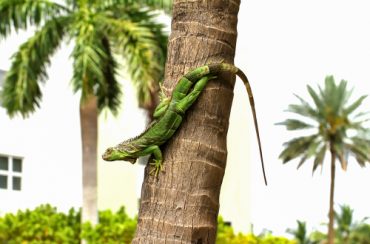

Well, not in Brevard County anyway. But south of here a few hours where Iguanas have become a permanent resident, they are literally falling from the trees.
The recent cold front had temperatures in Central and South Florida dipping into the low 40’s to high 30’s. Although unusual for South Florida, the temperature dip is very unusual for Iguanas. This is because S. Florida is much further north than their native climate (Central Latin America). So what are they doing in South Florida anyway?
If you lived in South Florida during the 70’s and 80’s chances are you never saw an iguana. But if you grew up there in the 90’s and early 2000’s you probably thought that they were just another Floridian animal sharing space with you. The fact is that the green iguana is an invasive species and has no apex predators. They are a menace to animals in the area.
It is believed that the majority of iguanas are descended from pet iguanas that were set free over the years. There are stories of pet trucks turning over on the highways and reptile museums being broken into. But one thing is for sure, they are wreaking havoc.
The Floridian lawmakers have declared open season on the pest. It is legal for any person to kill a green iguana. But, you may bite off more than you can chew if you don’t know what you are doing. These reptilian monsters can grow up to five feet long.
So why do they fall from trees? The iguana is a cold-blooded reptilian. When the temperatures drop extremely low the body of the iguana becomes rigid and the blood that pumps through comes to an almost standstill. It is basically a temporary hibernation mode that allows the animal to survive without freezing to death. As a result, any iguana that was in a tree will most likely lose its grip and fall to the ground. They appear to be dead but they are not. Once the sun hits them and/or temperature warms a little, they will start moving again.
Iguanas have been spotted in Brevard County. They are here in very small numbers. But the way the population has exploded south of here could mean that they are making their way up the coast. This would be very bad for our local environment.
